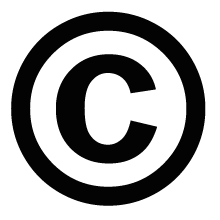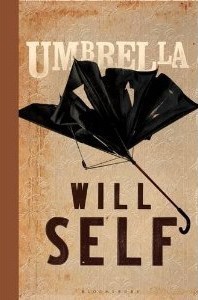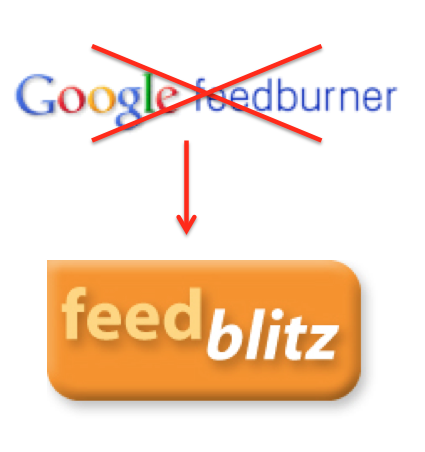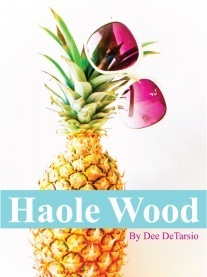Jane Friedman's Blog: Jane Friedman, page 185
August 17, 2012
Copyright Is Not a Verb
Today’s guest post is by copyright lawyer Brad Frazer. You may remember him from his previous post, Trademark Is Not a Verb.
“I copyrighted my book by putting © on the bottom of the first page.”
“This picture is on the Internet, so I can just ‘right-click’ and use it on my website.”
“I copyrighted this DVD by mailing it to myself.”
“We don’t have any copyrights because we never registered anything with the government.”
Have you ever said any of these things? If so, you are in good company—most people have. But they are all incorrect.
Should a writer copyright an unpublished work before submitting it to an agent or publisher? If a writer does not formally copyright their unpublished work and finds someone copying it or giving away free copies, how are they disadvantaged, if at all? How does a writer copyright her work?
As with “trademark” (see my previous post here), “copyright” also is not a verb. It, too, is a noun. Technically, a copyright is an incorporeal property right that springs into existence when a sufficiently creative idea is reduced into or onto a tangible medium. It’s actually like magic, like the Big Bang when the universe sprang into existence from a sea of quantum probability. When you write words on a page or draw a picture or sculpt clay or trip the shutter on a camera, the human being doing the writing, drawing, sculpting or tripping has created and is the owner of a copyright in the resulting work—assuming the resulting work possesses the requisite creativity. Done deal—no ©, no government filing, no mailing to oneself needed to create a copyright.
So, let’s assume you have written a book. If it is creative and is not a blatant rip-off of someone else’s work, it is likely you own the copyright in and to said book. There are some exceptions to that general rule regarding copyright ownership, all of which are beyond the scope of this article, but are briefly noted at the end of this post. If you sell a hard copy of that book, you are only transferring ownership of the paper, the ink and the binding. The incorporeal copyright remains with you on those facts because a copyright exists apart from the medium on or in which the work is tangibly embodied.
Said another way, when you sell a copy of a work you authored, you do not at the same time sell away your copyright in the underlying work. They are different concepts: the medium, and the copyright—a distinct intangible property right—the author possesses in the work contained within or on that medium. If someone copies your book, or large portions of your book, without your permission, that is likely an act of copyright infringement, since the owner of the copyright in a work is the only one who may lawfully make or distribute copies of that work.
But in the United States, for the owner of a copyright to have the ability to file and maintain a lawsuit in federal court for copyright infringement, the owner of the copyright must have registered the copyright at issue. This act of registering one’s copyright is accomplished by filing a registration application with, and paying a fee to, the Copyright Office at the Library of Congress.
So, should a writer copyright an unpublished work before submitting it? Said another way, should the author of a work file an application to register her copyright in that work with the Copyright Office before submitting it to an agent, a publisher or some other third party?
The answer depends on whether the author wishes to have a remedy to enforce her copyrights through a copyright infringement lawsuit in the event her work is copied or distributed unlawfully and her copyright is thus infringed. This is the key issue every author must address when deciding if registration of her copyright in a work is warranted: is the availability of a remedy for copyright infringement important? In general, agents and publishers will not knowingly infringe a copyright in a submitted work. To do so would be anathema to their reputation and their business, and so most authors should not be anxious about making routine, industry-related submissions of works that are not officially registered.
There is one very important “gotcha” that can arise from not timely registering one’s copyrights. In the United States, if you do not register your copyright in a work within three months of the date of first publication of that work, you will not be able to recover either your attorney’s fees or a special category of money called “statutory damages” in a subsequent copyright infringement lawsuit—even if you win. “Publication” for purposes of copyright law is defined differently than the common understanding associated with being a “published author.” Under copyright law, “publication” is very loosely defined as “giving or selling a copy of the work to a third person,” so remember that to have your full panoply of rights available if you do file a copyright infringement lawsuit, you must register your copyright. And if possible, register within three months of the date of first publication, as defined.
Important Caveats (to be elaborated upon in future posts)
Ideas are not protectable under copyright law. The idea of your book, e.g., cloning dinosaurs using ancient DNA, is not protectable.
Titles are not protectable in copyright. You may call your book “JAWS” without infringing on Peter Benchley’s copyrights, assuming you did not otherwise plagiarize Mr. Benchley’s words.
The presence or absence of the © on the work has no relevance to the issue of whether the author has registered her copyright. The © may be placed on any work without regard to whether the author has registered the copyright. It merely acts to show that the author is arbitrarily claiming to own a copyright in that work and to notify the world of that claim. In fact, most authors do not place the © on industry-related submissions as it tends to show a bit of naiveté on the author’s part, and the absence of the © does not impair the author’s copyright ownership claim.
You may not actually own the copyright in that work you think you just authored (e.g., work for hire and joint works).
You can contact me at bfrazer@hawleytroxell.com if you have any questions.
August 15, 2012
Build a Better Author Bio for Twitter
This Thursday (Aug. 16), I’m teaching a 2-hour live online class about marketing books via Facebook & Twitter. It’s through Writer’s Digest, $79 per person. Even if you can’t attend the live session, you get full access to the recording of the session for one year. I teach online classes with Writer’s Digest about 4-6 times per year. This is the only time I’m offering this particular topic in 2012. Click here to read more.
Before you decide to follow someone on Twitter, what’s the first thing you look at?
Probably the bio.
Let’s assume you’re on Twitter because it’s part of your author platform—whether you’re in relaxed mode or professional mode. Have you written a bio that’s likely to attract followers or turn them away? Let’s look at four basic components:
Photo
Name and handle
160-character bio
Link
Photo
Your photo will be showing up in a tiny, tiny square. For that reason, I recommend a clear and closely cropped image of your face, with good contrast. Here are a few examples.

L to R: Joanna Penn (@thecreativepenn), Kevin Smokler (@weegee), Dan Blank (@danblank), and Liz Castro (@lizcastro)
I’ve also seen successful use of illustrations, cartoons, and logos for Twitter avatars—and of course some kind of recognizable logo is usually the default for companies and organizations.

L to R: Maria Popova (@brainpicker), MediaBistro (@mediabistro), and April Hamilton (@indieauthor)
Name and Handle
Choose a handle as similar as possible to your actual name, or to your other social network account names. You may need to be somewhat creative (add underscores, initials, numbers, etc).
Even if your handle becomes alpha-numeric soup, you can and should add your actual name. Again, we’re discussing the Twitter account as a component of author platform.
I do not recommend adding “Author” to your actual name. I don’t recommend it for the handle, either. Save “author” exclamations for the bio.
Bio
Here we get to the real meat of the issue. What do you say in so few characters? Sometimes it’s easier to show you what to avoid rather than what to do. See below—name and handles removed to protect the innocent.

The Inspirational (or Witty) Quote or Aphorism

I Get the Feeling You’re on Twitter Only to Market Your Book

The Bio That Tells Me Nothing
A strong bio will give people:
information about your industry or work, if that’s why you’re on Twitter
a good indication of what you’ll be tweeting about (explicitly or implicitly)
a little personality and/or where you might find common ground
As far as that third item, it’s popular for people to mention their hometowns or states, the universities they graduated from, or other things we share in meet-and-greet environments. That little bit of personality is more often than not what starts a conversation on Twitter. For me, it’s bourbon and usually my city of residence. (I do highly advocate listing your location—again, it’s likely to spark more connections.)
Notice what I did NOT say was part of a strong bio:
a list of every book you’ve ever published
exhortations to go to Amazon to buy your book
a laundry list of all your hobbies and interests
There’s nothing wrong with putting your most recent book title in your bio. Just don’t make your bio sound like your book release is the only reason you’re on Twitter.
Link
Twitter gives you the opportunity to list one link in connection with your bio (though you can stuff your bio with more—not recommended, since you may come off as a promotional whore).
The best place to link is almost ALWAYS to your own website. If you don’t have a website, and you’re a serious author, then what are you waiting for? Your efforts on social media will go much further if you have some place for people to visit and uncover more about you and your work.
For unpublished writers
People often ask if their bio should say something like “Aspiring writer looking for agent.” That’s not a horrible thing to state, but if it were me, I’d say, “Working on [X book/genre] about [Y topic].” Few people clamor to meet more aspiring writers. Interesting people working on interesting projects: Yes!
What kind of Twitter bios do you like or dislike? Share your tips in the comments.
August 14, 2012
EXTRA ETHER: Bookstore Bake Sale
Why do all the ladies of my parish bake cupcakes once a month and sell them to each other?
That line, from John Updike’s The Centaur, came back into my preacher’s kid head as I read a post by one of my fellow contributors to Writer Unboxed.

Sarah Callender
The writer Sarah Callender (good hat) was coming awfully clean. She wrote:
I have bought many, many books on Amazon. Please know my head is low and my cheeks are red as I admit this to you.
This, as a confessional, sits well beside such soul-searing lines as I used to hear congregations belt out in chancel-flattening unison:
We have erred, and strayed from thy ways like lost sheep. We have followed too much the devices and desires of our own hearts. We have offended against thy holy laws. We have left undone those things which we ought to have done; And we have done those things which we ought not to have done.
Told you I was a minister’s son. That’s actually from the Book of Common Prayer. Episcopalian, not Methodist. Daddy was eclectic. I’d say he was catholic in these matters, but that confuses people who don’t know Catholic from catholic.
If I owned a bookstore, I'd have batteries at 25% off right next to that 50 shades thing book.[image error]about 13 hours ago via web Reply Retweet Favorite Major Unzipped Fly
Let’s try it. Will you take the beat from me?
We have taken advantage of free shipping with Amazon Prime; we have wallowed in history’s best customer service and algorithmically low-balled prices, while partaking of the luscious fruit of fabulous searchability and nearly instant downloads onto our Kindles; we have ordered those things we didn’t need instead of the portable prayer-kneelers we should have been paying $3.99 to have shipped overnight, same-day availability in certain areas.”
 Callender’s post, headlined Imagine Saving a Life: An Indie Bookstore Pledge, is inspired, it seems, by a missionary’s zeal for drawing a line between rightful behavior and patronage of Amazon.
Callender’s post, headlined Imagine Saving a Life: An Indie Bookstore Pledge, is inspired, it seems, by a missionary’s zeal for drawing a line between rightful behavior and patronage of Amazon.
She declares her willingness to “do my part to save the lives of independent bookstores.” And, in what I believe is completely genuine statement of hope, she wants us all to do the same.
So will you, too, make a pledge to buy one book per month from an indie bookstore? AND will you convince someone else to do the same? If you do that, and if your friends convince their family and friends to do the same, and so on and so on, we will pump enough life into the independent bookstores that are the lifeblood of our community.
Callender’s article was coming out just as we published Writing on the Ether with Peter Turner’s post-Kepler’s 2020 symposium.

Peter Turner
Turner headlined his post The Future of the End of Bookstores. In it, this longtime staunch ally of bookstores wrote of how he’s “discouraged, depressed actually, by the lack of innovative thinking” among bookstore people.
Immediately, Turner had properly blow-darted the Amazon-as-bogeyman approach so many well-intentioned bookstore lovers, like Callender, seem to think is correct.
Turner:
The general attitude among indie booksellers is to do whatever they can to discourage their customers from buying e-books from Amazon.
Additionally, the Huffington Post followed up with an interactive (of course) list, How To Save Bookstores: 28 Ideas From Existing Locations , no byline offered — divine inspiration, apparently.
And Ron Charles wrote a three-part series on the Kepler’s effort, starting with How to save an indie bookstore: Day 1 .
So so so so so great. New York's first sci-fi bookstore opens its doors http://t.co/Cu1nVtU1[image error]about 17 hours ago via Tweet Button Reply Retweet Favorite Joshua Topolsky
And here was Callender:
I understood that in getting lazy and cheap in my book buying, I had forgotten the magic of a bookstore. My children had forgotten it too. Shame on me.
Another thing ministers’ kids can spot around a corner: guilt.
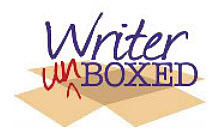 It is one slippery weapon in the arsenal of the righteous. It tends to blow up in the faces of the faithful. Scriptural soot. All over the place. Here is Skipper Hammond, who left a comment on Callender’s Writer Unboxed post:
It is one slippery weapon in the arsenal of the righteous. It tends to blow up in the faces of the faithful. Scriptural soot. All over the place. Here is Skipper Hammond, who left a comment on Callender’s Writer Unboxed post:
Dare I say (whisper)? Don’t guilt trip me. I’m too ornery to take a pledge. Too blind to read books that don’t have enlargeable type. Too crowded in my little house to build any more bookshelves. Too poor to support every worthy cause. I never bought from Amazon until my daughter gave me a Kindle and I look forward to the day when I can buy books for it at an independent bookstore. Until then, Don’t guilt trip me.
Callender handled this comment well:
Yes, ma’am! Sorry to offend. I, too, look forward to the day when ebooks are available at indie bookstores. I hope that day’s not too far in the future. The enlargeable font really is a blessing!
And most folks commenting on Callender’s post dutifully promised to buy diligently their one book per month from an independent bookstore.
First time seeing this in a bookstore. http://t.co/pSJg25i6[image error]August 10, 2012 2:04 pm via Twitter for iPhone Reply Retweet Favorite xnoɹǝʃ uɐıɹq
Callender does mean well. She offered three reasons she feels bookstores’ “lives” are worth “saving”:
Bookstores facilitate a more connected community.
Bookstores add personality and color to a community.
Bookstores are incubators (of creative effort and of readers)
Daddy might have liked that list, actually. Sounds like several of the ways he always enjoyed describing the place of a church in the community.
But gosh. How simplistic it all is to speak in these blandishments. Just take the first point, the “more connected community.” Good-hearted Callender writes cheerily:
Bookstores do much more than sell books. These days they have to.

Victoria Noe
The other side of that? Victoria Noe, a businesswoman and writer, in a Facebook conversation with several of us reflects the way doing “much more than sell books” can actually be a sign of a business that’s lost its way:
It’s not enough to say “indie bookstores/brick & mortar stores” should survive. Every business ultimately has to fill a need in order to survive. The best ones create a new need in their customers.
How many of these stores have created a new need as the world changed and the digital dynamic picked up the pace around us?
check out the pretty shelving in this comic book store — http://t.co/Modvl2TL
[image error]August 8, 2012 12:09 pm via webReplyRetweetFavorite
Tom Spurgeon
Turner also wrote of the do-many-things tactic when he came away from the ambitious Kepler’s program in Menlo Park. He noticed that the more the Kepler’s plan widens to include activities, the less it makes sense. There, the ideas include:
More events (in store, for a fee)
More non-book items
More serving of self-published authors for a fee via the Espresso Book Machine or some other POD solution
Can the character, these stores’ community-focusing personality, possibly prevail as their inventories and events swerve away from the nostalgic images many of us recall from our pre-digital childhoods? Turner:
That doesn’t look much like a bookstore to me.
Reinventing the Community Bookstore. A 3-day wrkshop to look at kepler’s Bks & peer into the future of bookselling http://t.co/FMno9bvh
[image error]August 7, 2012 12:52 pm via bitlyReplyRetweetFavorite
Publishers Weekly
Noe points out that the in-store cafés, often thought to be such a smart move for bookstores, aren’t necessarily the boon they appear. In many cases, café patrons will spend a day nursing a cup or two of coffee and never look at the bookstore shelves. In fact, they may be there with their laptops. Ordering from an online competitor.
Instead of trying to become so many things to so many people, Turner asked, why not consider aligning a bookstore’s original concept (selling books) with the fact of what’s happening to the industry?
Why can’t indie booksellers acknowledge Kindle’s market dominance and serve its customers with easy ordering in-store and via indie bookstore websites, securing an affiliate fee (from Amazon)?
https://twitter.com/ActuaLitte/status...
And from the UK, as if in answer to Turner, Philip Jones at TheFutureBook writes up A bundling experiment called “Clonefiles” and run at the independent bookshop Mostly Books by Osprey’s Angry Robot imprint. Jones writes:
The scheme offered the digital version of Angry Robot novels free to customers when they bought the physical paperback. Two weeks later Osprey chief executive Rebecca Smart told The Bookseller, that the initiative had trebled sales of the publisher’s titles at the trial store. The scheme has been supported in-store with a window display and signs explaining how it works. There is now an intention to roll it out in other independent bookshops.
“I wish I had read Helen Gurley Brown sooner…” Larry McMurtry and many other on #Cosmo‘s doyenne https://t.co/5qXaDLEF
[image error]about 13 hours ago via Twitter for iPhoneReplyRetweetFavorite
Small Demons
What’s more, there are instances of sheer novelty that can sustain and make famous a special bookstore, certainly. John Williams wrote the Times’ coverage Sunday of Larry McMurtry’s auction of some 300,000 books from his store Booked Up in Archer City, Texas, in Wanted, Dead or Alive: Used Books.
But wherever we may look for solutions, the problem is not Amazon.
I’ll say it again for you: The problem is not Amazon.
Which is why it’s such a misguided move to try to drive a wedge between that mammoth retailing powerhouse and its committed, loyal customers.
As big as it is Amazon is, the Internet it plies so well?–is much bigger.
And the Net’s entry into our lives, our workplaces, our homes, our culture, our careers, and, yes, our reading lives, was going to happen whether Jeff Bezos ever sat down in Seattle.
Reminder to self: Buy candles from Amazon once the power is back on.
[image error]about 5 hours ago via Twitter for iPhoneReplyRetweetFavorite
Derek Powazek
Look again. Those bracing memories we all love: the moment we were hand-sold Madeleine L’Engle’s A Wrinkle in Time or a series of books called The Little Colonel written in 1895 by Annie Fellows Johnston?–my grandmother showed me these on her best shelf. Those fond snapshots in our hearts are from a pre-digital era. Not from a pre-Amazon era.
Digital was coming, would come; has arrived; and it is the order of our day and night; the deal is done; the dynamic is ours.
We order online because it’s smart, not because we’re shirking some duty to independent bookstores.
Has anyone asked a beleaguered independent bookstore owner just how many of us buying a book a month from her or him it would take to “save the life” of that emporium? Do we even know that a bunch of well-intentioned buddies writing “Me, too!” in comments on a blog post can keep a retail venture on its feet?
Bookstore wedding sounds awesome …. RT @: 28 ways to save bookstores http://t.co/QsW8ZevM via @
[image error]about 13 hours ago via HootSuiteReplyRetweetFavorite
Tiny Park
In the early 20th century, I could have told you that the horse and buggy ride offered fresh air, a gentle “clop clop” instead of engine noise, no gas fumes, and no flat tires. And I’d be right. But the Model T being driven into our culture by Ford would still have won out.
Sometimes asking everybody to resist change by trying to preserve the familiar against the evolution of commercial forces is futile. You’re welcome to keep that buggy in the garage. You’ll just have to build a second garage for the Model T.
Salvation, as any good PK can tell you, is never in the offering plate. It’s in finding a place, a purpose, a niche. And these stores have had a hard time doing that because — as with a lot of other businesses — it has simply become a lot more practical for consumers to patronize online retail outfits.
A knees-up round of guilt because we’re doing the sensible thing and shopping online won’t help a single bookstore. With all respect for the sincere and heartwarming intentions of good colleagues like Callender, let’s not perpetuate digital resistance.
Just got internet connection at the bookstore. Now maybe I can get computer work done during daylight and save a few night hours for sleep.
[image error]August 12, 2012 8:46 am via webReplyRetweetFavorite
Books On Main
Let’s insist that stores we love find a way to thrive in our digital context. There are some fledgling efforts to get ebooks into retail outlets, you know, such as the Canadian beta Enthrill, now in more than 100 stores. And as Laura Hazard Owen has reported at paidContent, Livrada is putting ebook gift cards into Target stores in the States.
Those schemes are early tries. We’ll need much more aggressive, integrated, practical, non-sentimental thinking. Because how long can you artificially prop up a bookstore with monthly sympathy buys?
Please. Not the cupcakes. We’re way beyond bake sales this time.
Or am I out of my mind? Feel free to say so (you won’t be the first). What do you think? Can we possibly hope to freeze-dry our bookstores with fellowship suppers and buy-a-book campaigns? Until when? — after how many eons will we thaw them back out? Which do you choose? Are you a preservationist? Or an evolutionist?
Join us Thursdays at JaneFriedman.com for Writing on the Ether, presented this week by Ether sponsor Roz Morris and her novel, My Memories of a Future Life.
Main image: iStockphoto / angie_lemon
August 13, 2012
Selling Flash Fiction Via E-Mail—Successfully
Today’s guest post is by author Bruce Holland Rogers, whom I recently met while teaching at the Whidbey MFA program.
Since 2002, I’ve been selling my flash fiction by e-mail to paying subscribers. The venture has been the core activity of my writing career for more than a decade, but it began with what may have been a lie.
According to a story that I read in a book about guerrilla publicity for writers, a limericist had offered a daily limerick by e-mail to anyone who would send him a dollar. He had earned $100,000 dollars this way in the first year. I was enchanted. Maybe I could use the same model for my short-shorts.
I launched my service, shortshortshort.com, on a sliding scale. If I could convince one person to pay me for an annual subscription, I would e-mail that person one story. If I signed up ten readers, they’d get four stories. When I had fifty subscribers, they’d each receive one story a month.
It didn’t take long for my subscription list to grow through word of mouth. Existing subscribers were my sales force, because if they could get others to subscribe, it meant more stories for everyone. Eventually, afraid that quality would suffer if I had to write too many stories, I changed the terms of the subscription to three stories a month, or 36 stories in an annual subscription, no matter how many subscribers I had.
At times, I have had as many as a thousand paying subscribers. Like any sort of subscription, I lose subscribers through normal attrition. If I don’t work hard at retaining and recruiting subscribers, my numbers drop off. Right now, after several years of not trying very hard to find new readers, I have about five hundred subscribers. At $10 per subscriber, I’ve never reached the $100,000 annual income of the anecdote’s limerick writer, but shortshortshort.com earns me more than what most writers of very short fiction make. There have been other benefits:
Double dipping. The private e-mail list is what Ralph Keyes has called “privishing” rather than “publishing.” After a story has been seen by my subscribers, it still can’t be found by any member of the public who wants to see it. There’s no publication of record. So has it been published? Most magazines and anthology editors have said no, my e-mailed stories are not yet published, and those editors are willing to consider the e-mailed stories for more traditional publication. I credit such publication as “first time in print.” So I’m paid twice.
Reliable audience. I write all over the literary map, from little genre tales to brief literary ones. With shortshortshort.com, I have a readership that will follow me across categories.
Immediate gratification. I write a story, edit it, and put it before paying readers all on my own timetable.
Deadlines. Real ones, with actual customers I want to keep happy. I’m productive.
Audience response. (Happily, most often to tell me what they liked, but sometimes to say that a story was not their cup of tea at all.)
A ready mailing list. When I recently launched a Kickstarter campaign for producing a trade paperback edition of my latest story collection, I mentioned the campaign in the introduction to a subscription story. Most of my Kickstarter backers have been subscribers.
International reach. I have readers in dozens of countries.
Translation. Some of my fans are also translators. Currently, annual subscriptions to my stories are available in German and French translation. (The translator keeps half of the subscription money.) At one time, subscriptions were also available in Chinese and Bulgarian. There are plans to launch the service in other languages this year.
Some subscribers, the hardest of hard-core fans, periodically suggest that I charge more than $10 yearly, but I want the subscription to be cheap enough that almost anyone can afford it. I sign up a lot of subscribers at readings, and I think it’s pretty easy to part with $10 as an impulse purchase.
Some subscribers voluntarily pay more than $10. I think they do this in the spirit of crowd funding: the subscription is a cheap way to be a patron of the arts and keep a favorite writer in tea and biscuits.
In 2013, I’m going to concentrate some publicity and advertising efforts in my hometown of Eugene, Oregon, to try to build the subscription base locally. I’d like to be as well-known as a writer there as I am in, say, Portugal. This may be the wrong strategy for rebuilding my subscriber base, since people are often skeptical about whether any writer who happens to be local can be any good. However, I’m hoping that the appeal of patronizing a local artisan partly overcomes that bias. The slogan of my campaign: Locally Sourced, Organically Grown Short Fiction.
As for the limerick subscriptions, years after I had successfully launched shortshortshort.com, I tried to track down the writer of those $100,000 verses. I haven’t been able to find evidence that he ever existed outside of the pages of the guerrilla publicity book. (Should I alert Oprah?) But I’m grateful for the example that led me to begin my own cottage publishing business, whether that example was real or not. I write fiction myself. I like stories that inspire, even when—especially when—they inspire with pure invention.
Find out more about Bruce’s flash fiction by clicking here, and also check out his Kickstarter campaign!
August 7, 2012
EXTRA ETHER: Are You a Good Writer?
What does the online writing community hand off to good writers?
Good writers figure it out on their own.

The Omega “silent” starter pistol sends a “beep,” an electronic tone, to speakers positioned behind each runner on their starting block, so each athlete gets the signal at precisely the same moment.
No, this isn’t another hand-wringer about “Can Writing Be Taught?” But when I tweeted that “figure it out on their own” line the other day? The RTs went on and on.
A chord had been struck.
Or was that a starter pistol?
Since we’re all beginning to feel like volunteers at the London Olympics, I’m going to fashion this post as something of a relay. The baton of our shared thoughts here will pass from one writer to another. A quick 4×100. Ready…set…beep.
Off the Starting Blocks
Good writers figure it out on their own. Good writers develop a style that works for them. They write, they fail, and they write again.
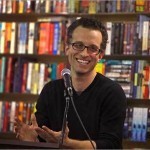
Micah Nathan
This “self-immolating preamble,” as he calls it, is from Micah Nathan, author of this summer’s Jack the Bastard, as well as Losing Graceland, and Gods of Aberdeen.
The trick is prying apart the words, the sentences, the paragraphs, and seeing how it all works.
Nathan is telling us what we don’t always remember, but we do know: those good writers aren’t dependent on finding the Magic Blog Post or the Holy Inspirational Devotion that can transform the third vampire author on the left into Michael Cunningham.
Good writers intuitively know this. They certainly don’t need me getting in the way.
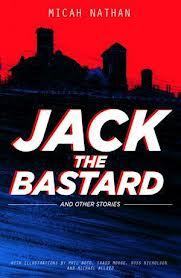 Nathan’s short essay is at Glimmer Train. Maybe it’s an anti-essay. (“I find these sorts of essays difficult.”) It’s called Selectively Stubborn. It’s been pointed out by Jane Friedman, host of the Ether and hashtag unto herself.
Nathan’s short essay is at Glimmer Train. Maybe it’s an anti-essay. (“I find these sorts of essays difficult.”) It’s called Selectively Stubborn. It’s been pointed out by Jane Friedman, host of the Ether and hashtag unto herself.
And it arrives at a time when we need gently to consider a kind of reckoning. No, a recognition. Well, maybe a recognition of what we’re not recognizing. A reckoning unreckoned. About this writing community business we engage in.
Nathan’s piece, of course, is talking-without-talking about aptitude. A faculty. “An inherent capability, power, or function,” as I read it in Merriam-Webster. A certain receptivity to the “goodness” of “good” writing that some have, others don’t.
@ @ @ Indeed. There are things to be taught but at a certain point he’s right.
[image error]August 5, 2012 10:05 am via Twitter for iPhoneReplyRetweetFavorite
Mary Sutton
@ @ @ More honed than taught. The talent is intuitive; it requires sharpening.
[image error]August 5, 2012 11:18 am via webReplyRetweetFavorite
Micah Nathan
It’s easier if I do this in music because that’s not what do here at the Ether. So it’s less freighted with emotion.
What made Claude Debussy think he could cluster those tones into parallel chords and get some pentatonics going so well that for generations his work summoned up an ersatz Greco-mythic soundscape? Still gorgeous. Eleven years in the Conservatoire didn’t do that. It’s not what they taught in 19th-century Paris. Debussy was “good.” He had something going on inside.
@about 14 hours ago via Twitter for iPhone Reply Retweet Favorite Chris Kubica
Handoff: Micah Nathan to Jane Friedman
In fact, I don’t see this concept of the “good” writer as dropping the baton in terms of what Friedman wrote in a contribution to Writer Unboxed in June 2011. (Nor am I saying the “good” writer doesn’t have to get in those 10,000 hours of “practice,” either.)

Jane Friedman
In 5 Things More Important Than Talent, Friedman wrote of how she dislikes getting the question from writers, “Do I have any talent at this?”
She enumerated “five questions I find more relevant and meaningful”:
What makes you remarkable?
What’s your community?
What risks are you taking?
What do you do after you fail?
How do you deal with change?

Photo: Flickr / John-Morgan
Offhand, that might sound as if she’s saying to forget being “good,” it’s more in how you work the system. But no, she’s saying that whatever your talent does bring to the table — whatever that being “good” thing is, if you’ve got it — you don’t become successful by staring at it all day. You succeed by making something of it. And that’s where your attention needs to go. Not to “Do I have any talent at this?”
When you listen to L’après-midi d’une faune, are you worrying about whether Debussy was born with perfect pitch?
And when you read Andrew Miller’s Pure, are you nattering away to yourself about how his prose is, as Jonathan Beckham correctly terms it for the Literary Review, “crystalline, uncontrived, striking, and intelligent?”
No, they’re just “good.”
Remember, Nathan noted, “Good writers intuitively know this.”
They know who they are.
RT @August 5, 2012 11:38 am via web Reply Retweet Favorite Darrelyn Saloom
Handoff: Jane Friedman to Jacob Silverman
Let’s say you’re part of this web of writers, fiction-lovers, literary editors, and readers in the social-media world…
Hey, sounds like us, doesn’t it?
If you spend time in the literary Twitter- or blogospheres, you’ll be positively besieged by amiability, by a relentless enthusiasm that might have you believing that all new books are wonderful and that every writer is every other writer’s biggest fan.
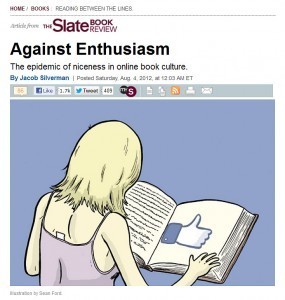
Slate’s illustration for Jacob Silverman’s piece is by Sean Ford.
This is Jacob Silverman writing at Slate. Interestingly, he’s a contributing editor to Virginia Quarterly Review, where Friedman is based. His piece is headlined Against Enthusiasm: An epidemic of niceness in book culture. And we need to pay attention to it.
It’s not only shallow, it’s untrue, and it’s having a chilling effect on literary culture, creating an environment where writers are vaunted for their personal biographies or their online followings rather than for their work on the page.
I’ve got some questions for you. Don’t answer them aloud. Just “ponder them in your heart,” as the Bible would have it.
How many times have you actually read the published work of your own social media contacts?
How many of your social media cronies must you simply never read, and you can tell that? –and not just because they work in a genre you don’t get into but because you know that if you read them, what you found there wouldn’t be…everything we might hope?
Have you ever helped out a social media buddy with a good review or five stars or a big thumbs up, way up, when you (a) hadn’t read the book or (b) didn’t like the book but felt you couldn’t say that, and/or (c) didn’t feel you could just be quiet, and/or (d) knew you were going to need their help with a review later — whether they liked your work or not?
How frequently do you tell a social-media contact that there’s something less than “fab” about their latest blog or guest post? Or do you, instead, just gush?

Jacob Silverman
Silverman is ready:
Why shouldn’t writers and lovers of literature construct an environment that’s wholly comfortable and safe? When your time comes, when your book is published or you finally land that big feature, don’t you want some applause too?
But after surveying the demise of serious literary criticism, he circles back to “the superstructure of the literary world,” our online hives in which “we congregate, allowing us to collapse geography at the expense of solitary thinking.”
We like, favorite, and heart all day; it is a show of support and agreement, as well as a small plea for attention: Look at me, I liked this too. Follow back?
Silverman makes his best argument before we pass the baton one more time, emphasis mine:
A better literary culture would be one that’s not so dependent on personal esteem and mutual reinforcement. It would not treat offense or disagreement as toxic. We wouldn’t want so badly to be liked above all. We’d tolerate barbed reviews, some quarrels, and blistering critiques, because they make our culture more interesting and because they are often more sincere reflections of our passions.
So does the good writer hand out — or want — gushing critiques, merely to engage in the warm-and-fuzziness of it all?
The culture of enthusiasm on twitter is out of hand. Henceforth, I'll only be telling you what I dislike about the books we publish.[image error]about 15 hours ago via web Reply Retweet Favorite Melville House
Last handoff: Jacob Silverman to Will Self
My publishers did look a bit grim when it (the new book, Umbrella) came in. I think they felt it was resolutely uncommercial and wouldn’t find readers. But you know…”

Elizabeth Day
This is Elizabeth Day in her graceful observation for the Guardian of author Will Self: ‘I don’t write for readers.’
Five days after we meet, (Self’s new novel) Umbrella is long-listed for the Man Booker prize. It turns out that some other people must like it too.
In the UK, Self’s Umbrella publishes August 30.
In the States, it’s available at this point only for pre-order at Amazon, with an American release date of January 8 from Grove Press.
I want to show you a “good” writer at work. The kind of writer Micah Nathan was getting at in his truncated essay.
Here is Day in her piece, quoting Self:
“I don’t really write for readers,” Self says …”I think that’s the defining characteristic of being serious as a writer. I mean, I’ve said in the past I write for myself. That’s probably some kind of insane egotism but I actually think that’s the only way to proceed – to write what you think you have to write. I write desperately trying to keep myself amused or engaged in what I’m doing and in the world. And if people like it, great, and if they don’t like it, well, that’s that – what can you do? You can’t go round and hold a gun to their head.”

Will Self
Now, contrast that to our community of kudos, our +1s and +Ks and chucks on the digital chins of our mates, all of us being so swell together, as Silverman shows us…and, again, how many of the books of your pals had you actually read when you gave it some thought?
Day is a generous journalist, who stops to be sure we don’t mistake the “Self rule,” if you will, of writing for himself as arrogance:
As it happens, Self is pleased to discover I did like the book. “It makes a difference,” he says.
Day goes on to fill us in on such details as his fondness for the robusta coffee bean — “Self’s conversation is full of such interesting digressions, the product of a restless mind accumulating facts like magpies do glitter.”
And Day’s conversation with Self is a deep and affecting profile, I commend it to you as an example of the kind of work we need to see more of when it comes to our authors.
Then again, we need good authors to profile, don’t we?
Will Self: ‘I don’t write for readers. I write for a small family of penguins.’
[image error]about 16 hours ago via webReplyRetweetFavorite
Lee Jackson
Finish Line
And here we are, our relay done, the baton safely all the way around the track…and where do we look for such authors?
Can you make them out among us between the RTs and the MTs and the status updates and the cat pictures? I’m not sure I can.
These good writers.
Micah Nathan’s work urges us to “cultivate selective stubbornness.”
By “selective” I mean paying attention to the right folks—a good writer can tell who’s a right folk within minutes—and completely ignoring the rest. It also means not lying to yourself. Hemingway called it having a “built-in bullshit detector.” I can’t improve on that.
His advice, of course, is meant for the good authors.
Typical experience: 30 minutes writing comment on Jacob Silverman’s “Against Enthusiasm” on Slate only to have it vanish when I press Post.
[image error]August 3, 2012 10:48 am via Twitter for MacReplyRetweetFavorite
Ron Charles
We’ve rounded the track, handing off and handing off –
from Friedman’s counsel on questions about talent,
through Silverman’s calling of our collective bluff,
to Self’s rejection of this serve-your-reader mantra we hear so much, and
back to Nathan’s assertion that the good writer may well be working right now, getting on with it — and not flipping batons with the rest of us.
So here’s what I want to ask you:
Are you that good writer who figures it out on her or his own? Is this back-slapping online colloquy of ours really the best thing for good work? Do we respect good work? Or are we just here for the huzzahs and chest bumps and thumbs-up? Could it be easier to pretend we’re all good writers? –just passing the tweet-baton from one pal to the next?
Join us Thursdays at JaneFriedman.com for Writing on the Ether, presented this week by Ether sponsor Roz Morris and her novel, My Memories of a Future Life.
Main image: iStockphoto / nickp37
August 6, 2012
What Does Your Mother Think of Your Writing? Does It Matter?
Today’s post features an item excerpted from A Year of Writing Dangerously: 365 Days of Inspiration & Encouragement (New World Library, 2012) by Barbara Abercrombie. Barbara has published 14 books and numerous essays and articles, and has taught creative writing courses for almost three decades. She lives in Santa Monica, California. Find out more at her website.
When I have guest speakers in my class who have written memoirs, one of the first things my students ask is, “What did your mother say when she read it?”
But what about mothers writing about their children? My kids have some pretty amazing material, but that’s one privacy line I won’t cross in my writing. I’ll write about them—the funny stuff—but I won’t steal the heavy moments in their lives.
Though just recently, as I was discussing this with a daughter, she said in a dark tone, “Remember writing about the Snickers bars under Gillan’s bed?” I asked her what on earth she was talking about. “You wrote a poem about her messy bedroom,” she said, “and then read it to her class.”
The thing about being a writer is that you just learn to live with your guilt.
I never once encountered a student who didn’t worry, at some level, that a friend or family member was going to be violated, punished or crucified in a piece of writing. (Mothers take an exceptionally heavy rap with younger students.) … And it often afflicted young writers with classic writer’s block before they’d written so much as a single word.
—Carol Shields
From Jane: I’ll never forget the following Twitter status update from Anne Lamott:
You own everything that happened to you. Tell your stories. If people wanted you to write warmly about them, they should’ve behaved better.
What do you think about this issue? Share your thoughts and experiences in the comments. And read more from A Year of Writing Dangerously over at Amazon.
August 3, 2012
Avoid Opening With Dialogue
It’s a typical pet peeve of editors and agents: Stories that begin with dialogue.
In the latest Glimmer Train bulletin, author Benjamin Percy explains why a dialogue opening is so often ineffective:
When a reader first picks up a story, they are like a coma patient—fluttering open their eyes in an unfamiliar world, wondering, where am I, when am I, who am I? The writer has an obligation to quickly and efficiently orient.
Which is why writers should avoid opening with dialogue. I know, I know—you can think of ten thousand awesome stories that do exactly that. I don’t like any them.
Read more of Percy’s essay—in the latest Glimmer Train bulletin—by clicking here.
Or read two other essays from the bulletin:
“Good writers figure it out on their own,” says Micah Nathan.
What is writing? Why do we write? Johanna Skibsrud discusses.
August 1, 2012
Why I Stopped Using Feedburner to Serve My Blog Subscribers
When I launched this site in late 2009, it was a no-brainer to use Google’s free service Feedburner to give people a means to subscribe to my blog via e-mail or RSS. It was clean, simple, and easy to integrate into my WordPress site. It also required no work from me.
Nearly three years later, it feels like a dead-end solution. It’s not being actively developed or supported. Last week, after not posting to their Feedburner Adsense blog in 2 years, Google finally said they’re shutting it down. The primary Feedburner blog hasn’t been updated since 2011. Google also recently shut down their Twitter account for Feedburner, where they had 12,000 followers.
However, Feedburner is free, so it’s hard to shake your fist at them. And since I’m not directly/actively monetizing this site, moving to a paid service doesn’t make a lot of sense.
But I believe in two things: (1) the power of e-mail communication (at least for my demographic of readers) and (2) the power of providing good service to those loyal readers. As of this writing, I have 1,000+ people subscribed to this blog through e-mail, and another 1,000 through RSS. These are valuable readers, and they deserve to be taken care of.
Why was I dissatisfied with Feedburner?
I couldn’t offer subscribers the option of weekly digests.
I couldn’t send a message only to e-mail subscribers.
I couldn’t include anything additional in the e-mails (e.g., sidebar info or ads)
I couldn’t add sharing or forwarding buttons in the e-mails.
I couldn’t add a preview of comments on the posts.
I couldn’t remind readers of most recent posts.
And there were many other reasons, but you get the idea. Further customizing the messages or delivery wasn’t possible.
7 Steps I Took Before, During, and After Leaving Feedburner
1. I compared my subscriber lists. I use MailChimp to send out a side e-newsletter about 6 times per year. (Since this list is under 2,000 names, I use MailChimp for free.) I anticipated there would a huge overlap between e-newsletter subscribers and my blog subscribers (which would ultimately lead to savings if I decided to use MailChimp). There was almost zero overlap.
2. I asked readers for their feedback. Maybe I was the only one who saw a need for a weekly digest, or more interactivity in the e-mails. Plus, if it ain’t broke, don’t fix it, right? I received about 200 responses, or about a 20% response rate. Preferences were split right down the middle, with a slight edge to people who preferred a weekly digest. About 10% of those responding said they’d stick with their subscription no matter what. One amusing result of my survey: nearly everyone justified their preference (daily vs. weekly) by saying that it saved them time or energy. This clearly illustrates that we should never assume that what saves US time is what will save OTHER people time. We all manage communication very differently.
3. I chose a new service. I was about to pull the trigger with MailChimp, but it wasn’t as customized to my needs as FeedBlitz, which is partly marketed as a solution to dissatisfied Feedburner users. I would’ve needed to hire an HTML coder to help me get full use out of the MailChimp option, whereas FeedBlitz was more plug-and-play. Interestingly, both services cost the same for my volume of subscribers: $30/month. As an aside, I wouldn’t be surprised if MailChimp further improves its RSS-to-email service into something I can’t resist. Its interface is beautiful and easy to use, so I hope it keeps developing its RSS option with knowledge that more people are likely to flee Feedburner.
4. I activated Feedblitz. I migrated my Feedburner e-mail subscribers using Feedblitz’s system. (If necessary, you can have Feedburner export all of your subscriber e-mail addresses into a .csv file. This would’ve been necessary if going with MailChimp.) I also set up new e-mail templates in Feedblitz to include all those things I couldn’t include before (social sharing buttons, recent comments, etc).
5. I deactivated Feedburner for e-mail subscribers. This is a matter of checking a box inside Feedburner that says “Deactivate e-mail subscriptions.”
6. I replaced links on my website, redirecting new subscribers to my new e-mail subscription form at Feedblitz. Click here to see the page.
7. I directly e-mailed all my existing subscribers about the change. Using Feedblitz’s special newsflash feature, I informed existing e-mail subscribers about how they can switch to a weekly digest. I didn’t have to post anything to my blog.
And that’s it. I’m now a Feedblitz user. Later this year, I hope to have an update about how it’s going—if my site traffic, subscribership, and blog engagement has changed as a result.
If you’re using Feedburner, FeedBlitz, MailChimp, or another service for e-mail updates, I’d love to hear about your experience and tips in the comments!
July 31, 2012
EXTRA ETHER: Shadowy Platforms
I’m convinced that epublishing is another tech bubble, and that it will burst within the next 18 months.

Ewan Morrison
Oh, good. Another happy face in the digital dance.
The reason is this: epublishing is inextricably tied to the structures of social media marketing and the myth that social media functions as a way of selling products. It doesn’t, and we’re just starting to get the true stats on that.
A grain of salt is advised: This is, after all, author Ewan Morrison, a rollicking good iconoclast who likes to worry the winsome and jangle the jaded at such events as the upcoming Edinburgh World Writers’ Conference in August.
As recently as February, the Ether wrapped its gaseous skepticism around Master Morrison’s pronouncements.
And his next book is Close Your Eyes, coming in September. Oh, goodness gracious, look at this, it’s coming in a Kindle version. Well, well, it appears that Morrison hasn’t yet given up all hope on what he calls epublishing, bless his heart.
One imagines he’ll just want to sell those ebooks very quickly, since he’s expecting it all to come apart:
When social media marketing collapses it will destroy the platform that the dream of a self-epublishing industry was based upon.
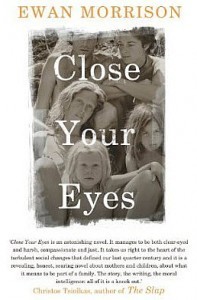 Nevertheless, as quickly as we may want to dismiss Morrison as simply warming up his pipes for next month, his piece in the Guardian, Why social media isn’t the magic bullet for self-epublished authors, comes quickly after a weekend in which many at Writer Unboxed engaged in a lively debate about the contemporary author’s struggle to balance writing (of, say, a book) with platforming (to, say, sell the thing).
Nevertheless, as quickly as we may want to dismiss Morrison as simply warming up his pipes for next month, his piece in the Guardian, Why social media isn’t the magic bullet for self-epublished authors, comes quickly after a weekend in which many at Writer Unboxed engaged in a lively debate about the contemporary author’s struggle to balance writing (of, say, a book) with platforming (to, say, sell the thing).
Might not an author, we debated, fall into emphasizing platforming over writing, thus slipping into a “shadow career” instead of what she had intended?
The shadow career is such a danger, particularly if you’re writing whole books. The short-term feedback hits are so appealing if you’re working on a project that’s going to take you a year or more before you get anything back.
– ‘Anabelle,’ in a comment at Writer Unboxed

Joanna Penn
Morrison invokes our current Writing on the Ether sponsor, J.F. Penn, author of Prophecy, for her prominent position in the UK as a platforming author:
As Joanna Penn says: “In a world with lots of talent, success requires more than simply being great.” She advocates, “more effective networking, of course!” Self-styled eSpecialists such as Penn often invoke the 80/20 rule which advises that, as a sales person (in this case an author), you should spend 20% of your time writing and 80% of your time networking through social media.
For her part, Penn has communicated to me that she feels “the Guardian piece wasn’t exactly complimentary, or indeed entirely true, so I’m not promoting the article.”
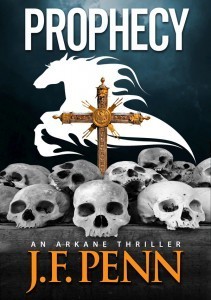 It’s just as well, really, that nobody at Writer Unboxed pulled out an 80%-20% formula. Some of our respondents seemed 100-percent anxious without such a prompt.
It’s just as well, really, that nobody at Writer Unboxed pulled out an 80%-20% formula. Some of our respondents seemed 100-percent anxious without such a prompt.
Our comment-exchanges were based in serious concerns about how to be both a productive, focused author and an adequately platforming promoter of one’s work. Therese Walsh and Kathleen Bolton’s Writer Unboxed has an especially articulate, engaged readership, with Vaughn Roycroft leading its community effort. There were no disappointments in the comments department this weekend.
Yep, and here I am, reading delicious, enticing blog posts instead of writing. It’s called procrastination in my world. The idea beckons, the editing awaits, but I’d rather not . . . Shadow lives and shadow worlds and shadow works.
– Normandie Fischer in a comment at Writer Unboxed
In my monthly contribution to Writer Unboxed, I had started with Steven Pressfield’s new book Turning Pro: Tap Your Inner Power and Create Your Life’s Work.
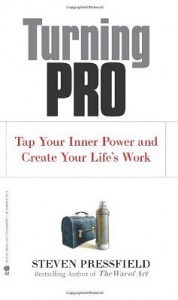 I isolated Pressfield’s concept of the “shadow career,” a Resistance-driven, denial-fueled near-miss that has a person doing a lot about a prized worklife, but not achieving the goal because he or she isn’t doing the work.
I isolated Pressfield’s concept of the “shadow career,” a Resistance-driven, denial-fueled near-miss that has a person doing a lot about a prized worklife, but not achieving the goal because he or she isn’t doing the work.
Here’s Pressfield in one of his clearest examples of this:
Are you getting your Ph.D. in Elizabethan studies because you’re afraid to write the tragedies and comedies that you know you have inside you?
I then cast this concept in terms of the ongoing debate in the writing community about platforming. My question:
“What if your author platform becomes your shadow career?”
Are we going where we think we’re going? Or are we addicted to being on a parallel track?
Are we building readership and bona fide community around our ideas and our art? Or are we gassing our best energies out into the Zuckersphere?
Are our platforms supporting our work? Or has our work become the rationale for the platforms?
I am going to have to think about this because the idea of a shadow career resonated with me so much. I’m afraid that’s what I’m doing, not just with my platforming, but my job, too. Doing “almost” what I want to do, but not really. Saving only a little time for what is I’m supposed to be doing.
– Tina Barbour in a comment at Writer Unboxed

Steven Pressfield
In the ensuing comment-conversation — which I hope you can find some time to look over — you hear several themes:
Internal wrestling matches about time spent writing vs. time spent platforming;
Deep concern (which Morrison is tapping into) about the actual efficacy of platforming — we still have little data on its effects; and
Particular resentment about time spent online in social media as vehicles for platform work.
I’ve been struggling with feeling guilty about NOT wanting to ‘build platform’ and focusing on the writing. How crazy is that? It kind of reminds me of the self esteem movement in the 90′s, where we couldn’t let kids experience failure or risk wounding their tender egos. When in fact, all we ended up doing was divorcing the outcome from the work.
– Lisa Cohen in a comment at Writer Unboxed
THIS. It worries me. “What if yr author platform becomes yr shadow career?” http://t.co/K0ZMpeV6 | @
[image error]July 28, 2012 1:13 pm via HootSuiteReplyRetweetFavorite
Jane Friedman
I note that by comparison to the Writer Unboxed readership, Morrison seems to spend little time on platforming as community-building. His emphasis is on the apparent logic of marketing online material (ebooks, as it were) in an online setting (a platform with, at least, online components). By contrast, the Writer Unboxed respondents seem to agree that readership cultivation is the goal of good platforming. If anything, many seem to blame themselves for not working out a formula to make it all work.
I have thought a lot about the amount of time I am spending on my blog relative to writing fiction. There is a real imbalance I need to address. My word count is way down and I know many writers are struggling with this balance.
– CG Blake in a comment at Writer Unboxed
But if anyone can undermine a basic confidence in the concept of the platforming author, it’s Morrison at the Guardian, who directs us back to the story by Alison Flood in May, reporting a survey’s findings of “less than 10% of self-publishing authors earning about 75% of the reported revenue and half of writers earning less than $500.”
Yes. I was lost there for a while. What’s worse, I started to feel I wasn’t very good at it, and so not only was I wasting time that might have been spent writing, I started to think there was no point. If I couldn’t craft a tweet that anyone would care to read, what business did I have writing a book?
– Jan O’Hara in a comment at Writer Unboxed
Building Author’s Platform in a Variety of Places http://t.co/S4RwlZri
[image error]about 22 hours ago via Tweet Old PostReplyRetweetFavorite
Nina Amir
There are, it should be pointed out, some authors hay-riding the platform bandwagon very happily:
Writing and platform are inseparable. They have to be. And I think every writer needs to sort that out herself.
– David Olimpio in a comment at Writer Unboxed
There also are enough questions, enough qualms about the efficacy of the author-platform idea itself, that Morrison can look forward to an attentive hearing in Edinburgh — and our authors aren’t likely to let this topic rest for some time to come. As Morrison, fond of coming up with those percentages, you know, asks:
Calculate your investment of time and money in writing versus social media. Do you want to spend 80% of 80% (sic?) of your time Facebooking about cats in the hope that you’ll make a 2.12% increase in sales on a book you had to write in 18 days?
| | |
How well do you think authors are handling the challenge of promotion in the digital disruption? How real is the danger of platforming becoming a “shadow career” that sidelines the creative work of writing books? And is Morrison simply rabble-rousing? Or has too much emphasis been placed on the arrival of the epublishing/self-promoting author?
Main image: iStockphoto / sack
Disclosure: When I provide a link to Amazon for a book, it’s an affiliate link, and I am an Amazon Affiliate; I might be paid a commission if you buy what I’ve linked you to. Your price is not affected by this. – @Porter_Anderson
July 27, 2012
A Small-Budget Advertising Experiment
Today’s guest post is by Dee DeTarsio. While it is more of a brief advertising anecdote than a serious ad campaign with strong conclusions, many authors ask me about online advertising (where, why, how). But I find it difficult to offer concrete advice on the matter since so much depends on the place where you advertise, whether or not your target audience sees your ad, what ad copy or images you use, and what your landing page is like. Still, I think this anecdote offers a nice peek behind the veil. On a related note, check out Elizabeth S. Craig’s recent post about her thoughts on what impacts her sales. (Hint: It’s not advertising.)
Chick-lit author Jen Weiner (The Next Best Thing) is my idol. I’ve reread everything she’s ever written, including her recent post that started out, “What if you were a novelist, hoping and praying for your new book to take off?”
Hey … that’s just about everyone I know. She mentioned her ads that were posted on literary websites, which is where I met Largehearted Boy.
Hearkening back to my old marketing professor’s three rules of advertising—KISS, hunt where the ducks are, and circulate to percolate (I told you he was old)—I pushed the go button. I acted Now! For a limited time only! and paid people ($200 for the first week of July) to pay attention to me, as I hoped and prayed my new book would take off.
“Take off” is such a strong phrase, but it was cool to see my book hanging out with the goddess:
Below, you can see the spike on the right side of the graph–Haole Wood made it all the way up to 21,000 on Amazon’s chart. (And I’m only being a little sarcastic.)
I published Haole Wood on May 15. For the month of June, I sold 87 copies, with 15 borrows. I also offered it FREE from June 7-11 (by being part of KDP Select) to the tune of 5,301 downloads. For the first two weeks of July: 32 sales, 14 borrows.
Just as I am not a wine connoisseur (and choose from the emptiest bin, relying on greater palates than mine), I followed the amazing Jen Weiner and her marketing gang to Largehearted Boy. Who wouldn’t love to have a few of her readers sample their wares? (Largehearted Boy has been an award-winning music, literature, and pop culture blog for the past eight years.)
My one-week run got 18,312 impressions, 22 clicks and five tweets. I’m pretty sure I was three of those tweets.
Would I do it again? Advertising is way more fun than abusing Facebook and Twitter (Holla! @Porter_Anderson!). There’s just that pe$ky little $ituation that sent me back to the drawing board.
I don’t have any idea why the book tanked on this chart on June 28. Was Mercury in Retrograde again?
Jane Friedman
- Jane Friedman's profile
- 1882 followers


